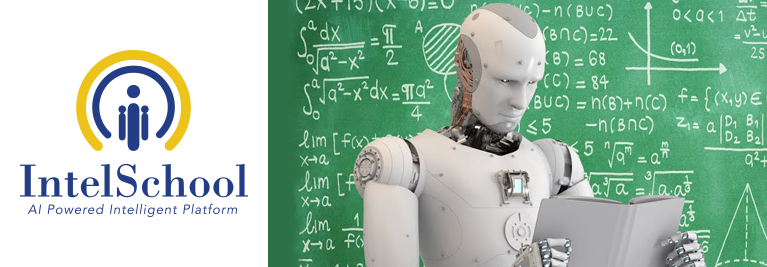Machine learning and AI, in the last few years, have silently entered every part of our lives. There is speech recognition, radiology in retail, coding, robotics, route optimization, and many other examples. In the information age, computers were told what to do. Now, with advanced AI combined with machine learning, and fast processing, systems can be fed with huge data sets so that they can analyze them and draw logical inferences, on their own. Code has risen to a level that it can now learn all by itself and provide humans with one of the biggest opportunities to further our knowledge and improve our education creating future smarter generations.
What is AI?
Some of the tasks performed by humans are taken over by intelligent machines that are in-built with artificial intelligence such as learning, planning, speech recognition, problem-solving and much more. Initially developed as a means to pass on knowledge, AI machines were meant to retain information and become smarter over time. This is primarily because they are not susceptible to information overloads, sleep deprivation, and memory loss like humans are. More recently, AI can be found in schools and universities, where the technology is used to assist learners and teachers alike, daily.
AI Changes education
The education industry has seen several changes since the introduction of AI.
Administrative processes are carried out free of any unwanted disturbances. To date, admin remains one of the most crucial aspects of education. Tracking attendance, recording results, generating reports, students’ progress checks, and much more, have to be performed repeatedly. These tasks cannot be subject to errors and yet, they are cumbersome. With AI, many of these can be automated to provide the school administration information about the progression of the teachers and other staffs, besides the improvement of the students.
Learning outside the classroom
Students can find it hard to focus or get the kind of attention that they require. With accessibility to a computer or a smartphone, they can learn from several online tools and resources available through a virtual assistant. AI aids in learning by providing answers to questions immediately. This way, students can even interact with virtual tutors outside of their classrooms.
Customized content
While textbooks do provide enough content within the confines of a classroom, computers provide students with useful supplementary information required to complete their education. Often these two are different. AI attempts to integrate both of them thus engaging students with individualized content suited to every learner. Additionally, textbooks can be condensed to prepare study guides making learning faster, easier and more effective. Practice tests, flashcards, chapter summaries and much more can be introduced to students along with newer principles and ideas. AI provides different ways of learning, including audio and visual methods, thus enabling students to choose learning styles that best suit their requirements.
One of the integral parts of education is practical training. Especially, when institutions are teaching large groups, it is not only difficult but also time-consuming to approach every student individually to teach them the experience. Instead, AR or Augmented Reality integrated with AI can provide enjoyable learning experiences thus bringing about significant changes in the education industry.
AI in education is still new, but IntelSchool has broken all barriers to emerge as one of the pioneers of improvement and advancements in learning by using AI in the most innovative ways possible, in education. Study guides, virtual lessons, administration, and much more is achieved with the help of our AI-based modules.
Improving Learning
An adaptive learning platform, IntelSchool includes modules for early learners as well as the most senior students. Interactive games amalgamated with hands-on learning is proffered through IntelSchool’s AI platforms.
Furthermore, IntelSchool’s adaptive education uses advanced computer algorithms to interact with the learner to address distinctive users’ needs.
Curated premium content is accessed by the students through providers who use machine learning to serve the next lesson. Automated processes throw up the ensuing best lesson required by the student.
Both informal and formal learning is improved with the help of language learning apps that combine matching and translation services. The apps can fully incorporate the benefits of machine learning.
Online learning, examinations and scoring systems are also powered by IntelSchool’s machine learning and AI systems. Writing and learning can be accomplished easily with our systems.
Students can learn the basics of robotics with AI since can be programmed to teach coding.
Test preparations can be accomplished through modules that are designed to meet study needs.
Next-gen school scheduling can be achieved while even drafting individual student schedules for personalized learning.
As machine learning keeps improving, students get a chance to learn and create VR experiences that use gesture and voice recognition, while providing better collaborative experiences.
Assistive technology with AI comes with several beneficial features for special needs learners with text modification, text to voice and voice recognition technologies.
Adaptive testing gives way to faster grading, tracking, and problem-solving while monitoring a student’s progress. Multiple resources can be combined to provide formative assessments and to measure skills that are otherwise hard to assess.
IntelSchool
Comprehensive learning management systems can be developed that can be expensively augmented by machine learning tools to combine the automation of learning and assessments. Besides, personalized learning modules can be developed to issue professional qualifications mixing both open and proprietary content.
Speak with agents at IntelSchool to augment your learning and educational environment with the help of artificial intelligence. The app comes with online tracking systems, digitized lessons for the student, grading processes, staff and administrative management, accounts and human resource management and much more.



